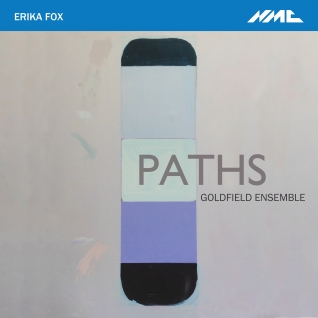Erika Fox – Paths (CD Review)

Erika Fox
Paths
Goldsfield Ensemble, Richard Baker, conductor
NMC Recordings
Once one hears Paths, the octogenarian Erika Fox’s first CD, their first reaction may mirror mine: one of incredulity. How is it possible that a composer this talented with such a distinctive and assured musical voice had to wait so long for a monograph recording? To their credit, NMC has been a strong advocate of female composers for a number of years; I’ve recently been enjoying their recordings of Elizabeth Lutyens’s music. Thank goodness they have partnered with the Goldfield Ensemble to present Fox’s work while she is still alive to hear the results.
Born in Vienna in 1936, Fox was a war refugee who moved as a child to England. Her music is strongly infused with cultural heritage; Chasidic chant plays a large role in its conceptual framework. A strong sense of linearity is offset by a piquant harmonic palette and lively rhythms. In addition to a deft hand with pitched instruments, the works on Paths display Fox’s imaginative sense of timbre in her use of percussion. Goldfield had to retain a large battery of instruments to realize the CD’s program. Ensemble member Kate Romano points out in personable and informative liner notes that traditional development isn’t deployed. Instead a single line will weave discontinuous musical arguments that don’t return for a recapitulatory visit.
The CD begins withPaths Where the Mourners Tread,a substantial work in which the aforementioned linear narrative is passed from instrument to instrument. One gets the sense of wending through a labyrinth of contrasting textures, holding on to the aforementioned linear thread like breadcrumbs through the forest. Fox’s provides a delightful, mysterious sound world in which to get lost. This is equally true of Quasi una Cadenza, which contains beguiling writing for winds. A downloadable bonus track, Kaleidoscope, is equally varied and compelling.
Pianist Richard Uttley supplies an incisive and persuasive performance of the solo work On Visiting Stravinsky’s Grave at San Michele, where Fox embraces the influence of other composers. Blocks of material and incisive rhythms evoke Stravinsky, particularly his late dodecaphonic pieces. There is also a hint of Messiaen in the bird call-like cries of the upper line. Another piece indebted to a twentieth century composer is Malinconia Militaire, which is based on a poem that references Anton Webern’s Opus 4 songs.
Café Warsaw 1944 closes the CD. It is a piece inspired by the Czeslaw Milosz poem “Café. All four, relatively brief, movements, are led by the percussion section. The poem’s discussion of “the quick and the dead” and the small distance between them once again inspires Fox to inhabit the work of the Second Viennese School, but pointillism and chromaticism are contrasted with repeated chords and arpeggiations from the piano and taut percussion lines.
Fox’s music often seeks rapprochement with the past, addressing the experiences of her refugee childhood and Jewish background as well as the ghosts of midcentury concert music. Still, the manner in which the composer synthesizes these elements supplies vividness and urgency very much in keeping with present day concerns. The Goldfield Ensemble plays assuredly throughout, giving these underserved works excellent documentation. Now it is up to the rest of the musical world to take up Fox’s compelling music and make it much more widely known. One hopes this will happen forthwith.
-Christian Carey